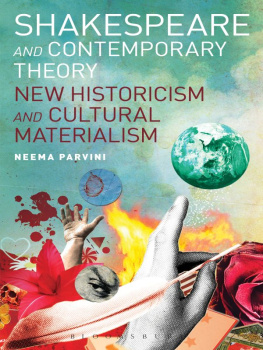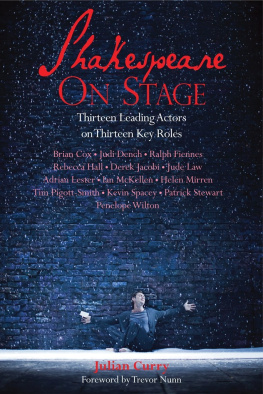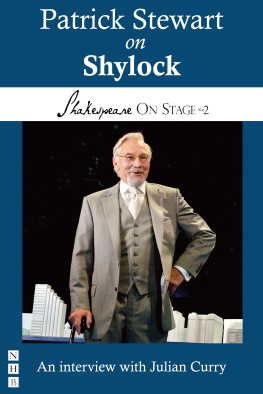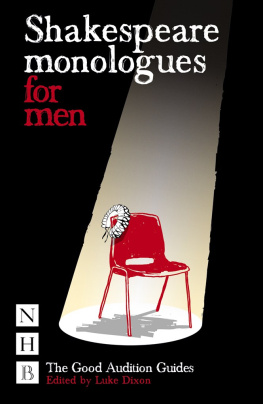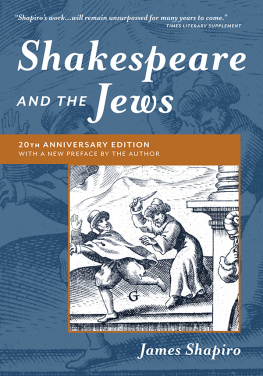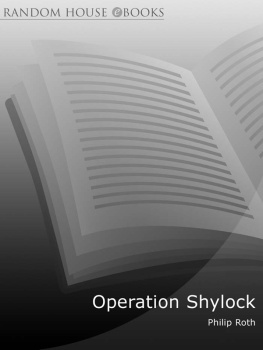SHYLOCK IS SHAKESPEARE
SHYLOCK IS SHAKESPEARE
Kenneth Gross
The University of Chicago Press
Chicago & London
kenneth gross is professor of English at the University of Rochester.
He is the author of Spenserian Poetics: Idolatry , Iconoclasm , and Magic (1985),
The Dream of the Moving Statue (1992, reprinted in 2006), and, most recently,
Shakespeares Noise (2001), published by the University of Chicago Press.
The University of Chicago Press, Chicago 60637
The University of Chicago Press, Ltd., London
2006 by The University of Chicago
All rights reserved. Published 2006
Printed in the United States of America
15 14 13 12 11 10 09 08 07 06 1 2 3 4 5
isbn -13: 978-0-226-30977-4 (cloth)
isbn -10: 0-226-30977-0 (cloth)
Library of Congress Cataloging-in-Publication Data
Gross, Kenneth.
Shylock is Shakespeare / Kenneth Gross.
p. cm.
Includes bibliographical references (p. ) and index.
isbn 0-226-30977-0 (alk. paper)
1. Shakespeare, William, 15641616. Merchant of Venice. 2. Shakespeare,
William, 15641616CharactersShylock. 3. Shylock (Fictitious character)
I. Title.
pr2825.g763 2006
822.33dc22
2005032150
The paper used in this publication meets the minimum requirements of the American National Standard for Information SciencesPermanence of Paper for Printed Library Materials, ansi z39.48-1992.
for
Angus Fletcher
Preface
This book is an essay on Shylocks singularity. It returns to the perennial strangeness of his life and presence in The Merchant of Venice , his opacity as a dramatic character. It examines how he organizes around himself the energy of the play even as he throws it off balance, shattering its generic clarity. Shylock has an atomic quality, compact yet explosive. His power lies in an emerging isolation of purpose and personwhat he will call his bondand in his refusal to be answerable to the ordinary terms of law or reason, at the same time as he makes the law his own. It lies also in an idiosyncratic eloquence that at once exposes and occults Shylocks inner life, even as his words show the world a mirror of its hidden rage. This eloquence has its darkly comic as well as its tragic aspects. His character embodies what you might call a poetics of repugnancy. There is something in Shylock that resists absorption or clarification. He is like a Mbius strip, his inside and outside continually turning into one another.
Shylocks ferocious idiosyncrasy makes a strange place for The Merchant of Venice within the Shakespearean canon as a whole. In the play, a character intended as one piece of a larger dramatic machine so draws the poets attention that he gains a life that threatens to dominate or deform the whole. If this begins as an accident, it leads to a genuine breakthrough, and after Shylock something in the plays is different. He looks forward to many aspects of the later playsthe wild interiority of the tragedies, for one thing, and their way of rooting into reality, private and public, through staging voices of rageeven as he remains a thing apart. John Berryman found a striking way to represent the discovery. He said that in Shylock Shakespeare first tasted blood. The metaphor suggests that Shakespeare is a hunting dog whose more predatory instincts suddenly find their proper object; or he is a creature who in tasting blood threatens to slip out of his domesticated role, his appetites reverting to a hunger for something more primal. The blood Shakespeare tasted would be, if I read Berryman rightly, both the blood of the audience and the blood of a character, or both together, their hearts blood. The blood that Shakespeare tasted was also his own. That is one reason why we can still taste it. One source of Shylocks interest is that he composes a powerful yet covert double for Shakespeare. Shylocks singularity translates Shakespeares singularity, which includes his chameleon-like capacity for disguise and his fascination with extremes of ambiguity, his ability to transmute pain and pleasure, his skill in marrying the general and the particular, and his ruthless way with audiences. Even as I describe Shylocks life in the play itself, I have attempted to evoke this shadowy identification, to give it imaginative force. The very name Shylock will claim us more strongly if we hear in it a hidden, echoic double of the name Shakespeare.
Related to these questions is another one, the issue of Shylocks complex afterlife in performance, fiction, and criticism, as well as in the language of antisemitic clich. This afterlifewhat John Gross calls Shylocks legacy, his deed of giftis more extensive than that of any other character in Shakespeares plays, save perhaps Hamlet, and even Hamlet cannot rival Shylocks chilling passage into the commonplace. I take up this matter primarily in discussing fictions by Heinrich Heine, Ludwig Lewisohn, and Philip Roth, and more briefly in remarks on Jorge Luis Borges and Marcel Proust. At their best, such writers turn us back to the riddle at the heart of the original play, even as they open it up to fresh literary, philosophical, and historical associations. One part of that riddle lies in Shylocks being a creature of antisemitic slander and one who transforms that slander, both resisting its misconceptions and tapping its rhetorical and psychic energies, playing with its violence, making that abuse serve him as mask and mouthpiece. His way of surviving in his world says something about how the character survives in history. The old question of what kind of human density Shakespeare has lent to Shylock remains inescapable. What we need is to see how the current of abuse becomes itself a tool for Shylock, one source of his intenser dramatic life, and part of what, ironically, humanizes him.
There are many friends to whom I am indebted in this book for their help and encouragement. Daniel Albright, Genevieve Guenther, John Hollander, James Longenbach, Herbert Marks, and Joanna Scott read the manuscript with probing eyes, letting me see better its shape and possibilities. An array of conversations with Tom Bishop, Harold Bloom, Soelve Curdts, Lawrence Danson, Richard Howard, George Kateb, U. C. Knoepflmacher, Christopher Ricks, Esther Schor, Nigel Smith, Adam Sutcliffe, Gordon Teskey, Rosanna Warren, and Froma Zeitlin led me to vital discoveries. As always, my students have surprised me with thoughts that made the play more surprising. I would like to thank my editor at the University of Chicago Press, Alan Thomas, and Erik Carlson, my copy editor. My deepest debt is to Angus Fletcher, who kept urging me to focus on the plainest questions, even as our conversations showed me so many doors to be opened, so many tracks to be pursued in the labyrinth of Shakespeares play.
A Note on Texts
All quotations from The Merchant of Venice are taken from the New Cambridge Shakespeare text, edited by M. M. Mahood (Cambridge: Cambridge University Press, 1987). Quotations from all other plays and poems of Shakespeare are from The Riverside Shakespeare , ed. G. Blakemore Evans, 2d ed. (Boston: Houghton Mifflin, 1997). Unless otherwise noted, all biblical quotations are taken from the Geneva translation (1560).
Chapter One
BEGINNING
If after the trial of Antonio I found myself walking with Shylock through some narrow street or calle in Venice (I say walking because I cannot imagine Shylock in a gondola), I would ask him the question that always hits me after reading or watching the trial scene: What could you have been thinking? Given what you know of Venetian society, polity, and law, and of the Venetians very particular malice toward you, what made you suppose that you would be allowed to take the life of a Christian merchant in open court? How could you think that you would be allowed to execute your mad bond, cut into Antonios flesh, and not only that, but in the process put so nakedly on display the Venetian laws impotence to save its ownindeed, its exquisitely adjusted power to abet you in your revenge? Recall how Shylock in this scene seems able to creep inside and become himself the vengeful spirit of his enemies laws, reanimating Venetian law for the purpose of murder rather than justice, profit, or order, stealing for himself the laws necessary, often concealed violence. How did he imagine he could survive the exposure of his own rage and contempt, which includes his contempt for the contempt that others have so regularly heaped upon him? He gives and hazards all the rage he has. He is the very spirit of hazard, even as he masters the scene. He makes himself an open wound onstage. He may surprise even himself in forcing into the open what is hidden, making out of his claim on the bond the fresh vehicle of an old anger, even if the sources and objects of that anger remain difficult to fix. I suppose you might say Shylock is confident that he will win his case, knowing how devoted the Venetians are to the laws that guard their economic power. But it is still a wild gamble, the wildest gamble in this play about fortune. In this scene Shylock puts the law to use but also shames the law and its upholders, those whom the law itself upholds. He strips the laws bare as he strips himself bare. The trial of Antoniowhich quickly turns into the trial of Shylockis for him what Wallace Stevens calls the accomplishment of an extremist in an exercise. It is as if King Lear, raging in the storm, were actually allowed to stage the demented trial of his cruel daughters, allowed to anatomize them before a court of madmen and fools, to cut open Regans chest to see if there is any cause in nature that make these hard hearts. In The Merchant of Venice , Shylock anatomizes his own heart as well as seeking Antonios. We do not know for sure what he wants to get back, or what he wants the pursuit of his bonds forfeit to yield him. Shylocks is a self-destructive project; it strips him of his living, if not his life. Yet it is a project that gains for him the impression of an interior life, a thinking, more unfathomable and harrowing than that of any other character in the play. It lends him an eloquence that is unaccountable both in its power and in its ordinariness. We start to see what William Hazlitt called the hard, impenetrable, dark groundwork of the character of Shylock.



